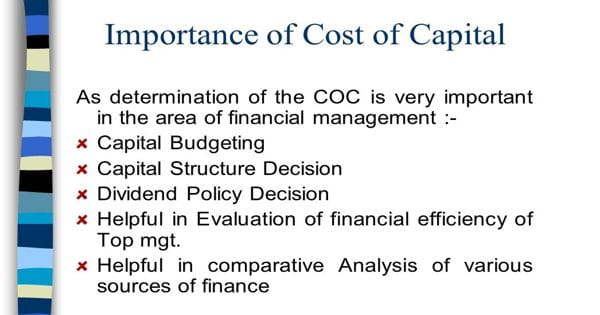Cost of capital is considered as a standard of comparison for making different business decisions. It is a useful finance and accounting tool that companies and investors can use to make better decisions on how they allocate their money. It has such importance in financial decision making.
Importance of Cost of Capital
Such importance of the cost of capital has been presented below.
(1) Making Investment Decision
The cost of capital is used as a discount factor in determining the net present value. It aids businesses and investors in evaluating all investment opportunities. It does so by turning future cash flows into present value by keeping it discounted. Similarly, the actual rate of return of a project is compared with the cost of capital of the firm. Thus, the cost of capital has a significant role in making investment decisions.
(2) Designing Capital structure
The proportion of debt and equity is called capital structure. The proportion which can minimize the cost of capital and maximize the value of the firm is called an optimal capital structure. It can also aid in making key company budget calls that use company financial sources as capital. The cost of capital helps to design the capital structure considering the cost of each source of financing, investor’s expectation, the effect of the tax, and the potentiality of growth. It is helpful in capital budgeting decisions regarding the sources of finance used by the company.
(3) Evaluating the Performance
The cost of capital is the benchmark of evaluating the performance of different departments. It can be used to evaluate the progress of ongoing projects and investments by matching up the progress of those investments against the cost of capital. The department is considered the best which can provide the highest positive net present value to the firm. It helps in evaluating the investment options, by converting the future cash flows of the investment avenues into present value by discounting it. The activities of different departments are expanded or dropped out on the basis of their performance.
(4) Formulating Dividend Policy
Out of the total profit of the firm, a certain portion is paid to shareholders as dividends. The concept of capital can be conveniently employed as a tool in making other important financial decisions. However, the firm can retain all the profit in the business if it has the opportunity of investing in such projects which can provide a higher rate of return in comparison to the cost of capital. On the basis, decisions can be taken regarding dividend policy, capitalization of profits, and selections of sources of working capital. On the other hand, all the profits can be distributed as dividends if the firm has no opportunity of investing the profit. Therefore, the cost of capital plays a key role in formulating the dividend policy.
In sum, the importance of the cost of capital is that it is used to evaluate the new projects of the company and allows the calculations to be easy so that it has a minimum return that investors expectations for providing investment to the company. It is a guideline to measure the profitability of different investments.
















